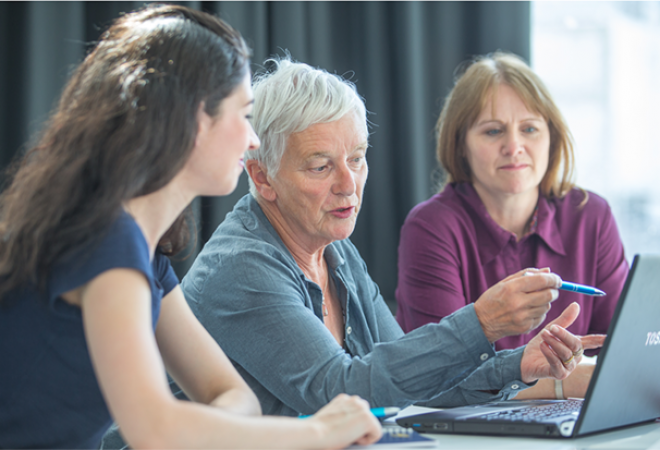
Professional development through mentoring support
Status
Completed: 21 June 2009
Project Details
A project completed in 2009, undertaken by Manukau Institute of Technology (MIT), to design and trial a mentoring programme for academic staff as a way of enhancing the student experience at Manukau Institute of Technology.
Aims:
The main aims of the project were to:
- to trial 'Teaching Champions' as mentors
- to concurrently develop the capacity of new teachers to self-reflect on their practice
- enhance new teachers’ long-term development with positive consequences for the learning experience of students.
Methodology:
The project used a qualitative methodology involving:
- a review of the literature
- selecting 'teaching champions' to work with new tertiary teachers in a programme of face-to-face instruction and tailored support
- a questionnaire survey of mentees and mentors
- interviews with mentees and mentors.
Team

Debra Robertson-Welsh
Project Leader
Manukau Institute of Technology
Mark Kirby
Manukau Institute of Technology
Dr Philip Harris-Worthington
Manukau Institute of TechnologyStatus
Funding
$10,000.00 (excl GST)
Key Findings
The key findings from the project included:
- There was overwhelming feedback from mentees and mentors which indicates an increase in the confidence levels of mentees with their teaching, and a genuine belief that their teaching practice has benefited by their involvement with this project.
- There have been other identified benefits to the mentoring programme, much of which is predicted by the literature on mentoring. For example, mentors have acknowledged their own personal and professional growth as one of the reciprocal benefits of mentoring; increased interdepartmental co-operation and dialogue has occurred in pockets where it might not otherwise have happened, and networks or communities have developed from the mentor-mentee grouping. These secondary outcomes are considered significant.
- The mentoring project supplemented other professional development initiatives introduced during 2008 at MIT. These included, among others, the establishment of a network of ‘teaching champions’ or exemplary teaching practitioners with the capability and willingness to share their expertise with their peers at MIT; the introduction of the Teaching Toolkit induction for academic staff which is designed to equip new lecturers with basic teaching skills prior to entering the classroom and receiving formal teacher training; and the trialling of communities of practice for learning and teaching in some departments.
- The project identified a number of professional development principles relating to mentors and mentees. Professional development should: be considered as something we do every day, part of day-by-day teaching practice; be relevant to participant’s personal and professional goals and contexts; be rigorous and research-informed and based on best available knowledge and practice; be presented over time, with sustained follow-up, and within a safe, respectful and supportive environment; encourage independent thinking, peer and self-reflection, and generate achievable and appropriate actions/outcomes; challenge points of view while being respectful of diversity in enabling lecturers to explore their own values, points of interest, and professional aspirations.
Key Recommendations
The key recommendations from the project concern mentoring practices and included:
Project management: The project is managed centrally by the Academic Development Centre (ADC). Mentors are allocated to mentees by the ADC on a fit for purpose basis. All communication with mentors by departments, faculties or their staff occurs through the ADC.
Mentors are funded for release time, of up to 1 hour per week.
Mentor selection | Mentors are recognised for the quality of their teaching practice, self-reflection is key to their own teaching, and they have the capacity and willingness to share their knowledge/skill with others.
Mentor training | Mentors are required to attend two half-day training sessions prior to commencing the mentoring relationship. Although mentoring is core to most teaching, the shift to mentoring peers created uncertainty for some mentors. The training is also important for consistency and coherency.
Mentor support | A community of practice has been developed, which is organised around monthly timetabled meetings which act as a support network and a professional learning opportunity for mentors. During these sessions mentors speak of their experiences, practices, and in some cases their anxieties. These meetings are also important for ensuring consistency within the group.
Mentoring relationships | Most mentors meet on a fortnightly or tri-weekly basis with mentees. However, each mentoring relationship is managed according to the particular requirements of the mentee. In some cases, these were regularly timetabled face-to-face events, at other times ‘meetings’ are email encounters, or held over the telephone, or bespoke and organised on a needs basis.
Mentor allocation | The importance of matching mentee and mentor was identified early, and a tool developed to assist with this. This consists of forms through which mentor and mentee provide information on teaching experience, their predominant methods of teaching, and their self-perceptions of their own teaching strengths (and ‘areas for development’ in the case of mentees).
Support colleague | Wherever possible, mentor work with new staff will be supplemented by a support ‘buddy’ allocated within the host department. Such a person would provide an introduction to the culture and processes of the new staff member’s department and demonstrate to new staff that MIT cares about the quality of their experience and success in their work.
Peer observation: Mentors are encouraged to observe their mentee as soon as practical in their relationship. Mentees are also encouraged to observe others teaching, and to assist with this MIT has developed a data-base of ‘teaching champions’ which lists a rich range of pedagogical practices for the mentee to experience.
Evaluation | There is ongoing monitoring to ensure that both mentees and mentors are appropriately supported. This is seen as a vital component to the ongoing quality of the scheme.
A research report prepared by Debra Robertson-Welsh and Mark Kirby.
(PDF, 478 KB, 32-pages).
- 19 June 2009
A resource prepared by Philip Harris-Worthington.
(PDF, 399 KB, 19-pages).
- 19 June 2009